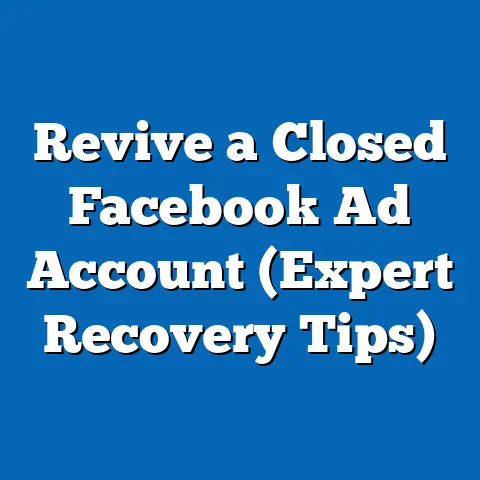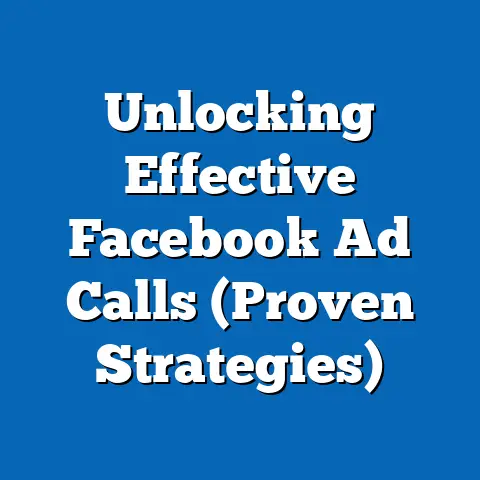Report a Facebook Ad Violation (Essential Guide)
Facebook ads have become an integral part of the digital marketing landscape.
As businesses increasingly rely on this platform to reach their target audience, it’s crucial that the advertising ecosystem remains safe, trustworthy, and transparent.
However, not all ads adhere to the established guidelines.
Ad violations can range from misleading claims and prohibited content to intellectual property infringements and improper targeting practices.
Reporting these violations is essential to maintaining the integrity of the platform, protecting users from harm, and ensuring a fair and equitable environment for all advertisers.
Understanding Facebook Ad Policies
Facebook’s advertising policies are the backbone of a responsible and ethical advertising ecosystem.
These policies aren’t arbitrary rules; they are carefully crafted guidelines designed to protect users, ensure fair competition among advertisers, and maintain the platform’s integrity.
Think of them as the guardrails on a highway, preventing advertisers from veering off course and potentially causing harm.
These policies cover a wide range of topics, from the types of products and services that can be advertised to the content and targeting practices that are permissible.
They are in place to prevent misleading or deceptive advertising, prohibit the promotion of harmful or illegal products, and protect intellectual property rights.
For example, Facebook prohibits the promotion of certain products like weapons, illegal drugs, and tobacco.
They also have strict guidelines against hate speech, discrimination, and content that promotes violence or incites hatred.
Furthermore, advertisers must adhere to guidelines regarding data privacy and responsible targeting practices, ensuring that ads are not discriminatory or exploitative.
According to Facebook’s own reporting, they removed over 3.2 billion fake accounts in 2019 alone, many of which were used to spread misinformation and run fraudulent ads.
This demonstrates the scale of the challenge and the importance of these policies in maintaining a safe online environment.
Ignoring these policies can have serious consequences for advertisers.
Facebook can disapprove ads, suspend or terminate ad accounts, and even take legal action against those who repeatedly violate their guidelines.
For users, encountering policy-violating ads can erode trust in the platform, leading to a negative user experience.
Key Takeaway: Facebook’s advertising policies are in place to protect users, ensure fair competition, and maintain the platform’s integrity.
Understanding and adhering to these policies is crucial for both advertisers and users.
Types of Facebook Ad Violations
Facebook ad violations come in many forms, each with its own potential impact on users and the advertising ecosystem.
Let’s break down some of the most common types of violations:
1. Misleading or False Claims
This is perhaps one of the most prevalent types of ad violation.
Misleading ads often make exaggerated or unsubstantiated claims about a product or service.
These claims can range from promising unrealistic results to misrepresenting the benefits or features of a product.
For example, an ad for a weight loss supplement that claims you can “lose 20 pounds in a week without diet or exercise” is likely making a misleading claim.
Similarly, an ad that falsely advertises a product as being “made in the USA” when it’s actually manufactured overseas would also be considered misleading.
These types of violations are harmful because they deceive consumers, leading them to purchase products or services that do not live up to their promises.
They also create an unfair advantage for advertisers who are willing to make false claims, putting honest businesses at a disadvantage.
2. Prohibited Content
Facebook has a strict policy against certain types of content that are deemed harmful or inappropriate.
This includes:
- Adult Content: Ads that contain nudity, sexually suggestive content, or promote sexual services are strictly prohibited.
- Hate Speech: Ads that attack, demean, or promote violence against individuals or groups based on race, ethnicity, religion, gender, sexual orientation, or other protected characteristics are not allowed.
- Violent Content: Ads that depict graphic violence, promote illegal activities, or incite hatred are also prohibited.
- Illegal Products and Services: Ads that promote the sale of illegal drugs, weapons, or other prohibited items are strictly forbidden.
These restrictions are in place to protect users from harmful content and create a safe and respectful online environment.
3. Intellectual Property Violations
Intellectual property (IP) violations occur when an advertiser uses copyrighted material without permission.
This can include using someone else’s logo, image, video, or music in their ad without obtaining the necessary licenses or rights.
For example, an ad that uses a popular song without permission from the copyright holder would be considered an IP violation.
Similarly, an ad that uses a competitor’s trademarked logo to mislead consumers would also be in violation of Facebook’s policies.
These violations are harmful because they infringe on the rights of copyright holders and can create confusion among consumers.
4. Improper Targeting Practices
While Facebook’s targeting options are powerful, they can also be misused if not used responsibly.
Improper targeting practices include:
- Discriminatory Targeting: Targeting ads in a way that excludes or discriminates against individuals or groups based on protected characteristics is prohibited.
For example, excluding people of a certain race or religion from seeing a housing ad would be considered discriminatory targeting. - Exploitative Targeting: Targeting ads at vulnerable populations, such as children or individuals with mental health issues, in a way that exploits their vulnerabilities is also prohibited.
These types of violations are harmful because they perpetuate discrimination and exploit vulnerable individuals.
Key Takeaway: Understanding the different types of Facebook ad violations is crucial for both advertisers and users.
By being aware of these violations, you can help ensure that the advertising ecosystem remains safe, fair, and trustworthy.
The Importance of Reporting Violations
Reporting Facebook ad violations is more than just a matter of following the rules; it’s an ethical responsibility that we all share.
By reporting violations, we contribute to a safer, more trustworthy, and transparent advertising ecosystem for everyone.
From my experience, many people are hesitant to report ads, either because they don’t think it will make a difference or because they don’t want to get involved.
However, every report matters.
Facebook relies on user reports to identify and address violations that might otherwise go unnoticed.
Here’s why reporting violations is so important:
- Protecting Consumers: Misleading or fraudulent ads can harm consumers by deceiving them into purchasing products or services that don’t live up to their promises.
Reporting these ads helps protect others from falling victim to these scams. - Maintaining Trust: When users encounter ads that violate Facebook’s policies, it erodes their trust in the platform.
Reporting violations helps maintain that trust and ensures that Facebook remains a reliable source of information and entertainment. - Ensuring Fair Competition: Advertisers who adhere to Facebook’s policies are at a disadvantage when competing against those who are willing to bend or break the rules.
Reporting violations helps level the playing field and ensures fair competition. - Supporting Facebook’s Mission: Facebook is committed to creating a safe and trustworthy advertising environment.
User reports are an essential tool in helping them achieve this mission.
It’s important to remember that Facebook’s advertising policies are not just for the benefit of the company; they are for the benefit of the entire community.
By reporting violations, we are all playing our part in upholding these policies and creating a better online experience for everyone.
Think of it like reporting a crime in your neighborhood.
You wouldn’t hesitate to report a burglary or an act of vandalism because you know it’s the right thing to do and it helps protect your community.
Reporting Facebook ad violations is no different.
It’s a way of taking responsibility for the online environment and ensuring that it remains a safe and trustworthy place for everyone.
Key Takeaway: Reporting Facebook ad violations is an ethical responsibility that we all share.
By reporting violations, we contribute to a safer, more trustworthy, and transparent advertising ecosystem for everyone.
How to Report a Facebook Ad Violation
Reporting a Facebook ad violation is a simple and straightforward process.
Here’s a step-by-step guide:
Step 1: Identify the Ad
The first step is to identify the ad that you believe is in violation of Facebook’s policies.
This might be an ad that makes misleading claims, promotes prohibited content, or infringes on intellectual property rights.
Step 2: Click on the Three Dots
In the top right corner of the ad, you’ll see three dots (…).
Click on these dots to reveal a dropdown menu.
Step 3: Select “Report Ad”
From the dropdown menu, select the option that says “Report Ad.” This will open a new window or tab where you can provide more information about the violation.
Step 4: Choose the Reason for Reporting
In the reporting window, you’ll be asked to choose the reason for reporting the ad.
Facebook provides a list of common violations, such as “It’s misleading,” “It’s offensive,” or “It’s a scam.” Select the reason that best describes the violation you’re reporting.
Step 5: Provide Additional Information
Depending on the reason you selected, you may be asked to provide additional information.
This might include explaining why you believe the ad is misleading or offensive, or providing details about the intellectual property infringement.
Be as thorough and accurate as possible when providing this information.
Step 6: Submit the Report
Once you’ve provided all the necessary information, click the “Submit” button to send your report to Facebook.
Step 7: Await Feedback from Facebook
After submitting your report, you’ll receive a confirmation message from Facebook.
They will then investigate the ad and take appropriate action if they find that it violates their policies.
You may receive an update from Facebook about the outcome of their investigation, although this is not always the case.
Tips for Reporting Effectively:
- Be Specific: Provide as much detail as possible about the violation.
Explain why you believe the ad is misleading, offensive, or infringing on intellectual property rights. - Be Accurate: Ensure that the information you provide is accurate and truthful.
False reports can waste Facebook’s time and resources. - Provide Evidence: If possible, provide evidence to support your report.
This might include screenshots of the ad, links to relevant websites, or documentation of intellectual property rights. - Be Patient: It may take some time for Facebook to investigate your report and take action.
Be patient and allow them the time they need to conduct a thorough investigation.
Key Takeaway: Reporting a Facebook ad violation is a simple and straightforward process.
By following these steps and providing accurate information, you can help ensure that the advertising ecosystem remains safe, fair, and trustworthy.
What Happens After Reporting
Once you’ve reported a Facebook ad violation, what happens next?
Understanding the process that Facebook follows after receiving a report can help you manage your expectations and appreciate the importance of your contribution.
After you submit a report, Facebook’s team of reviewers will investigate the ad to determine whether it violates their advertising policies.
This investigation may involve reviewing the ad’s content, targeting practices, and landing page, as well as any additional information you provided in your report.
The time it takes for Facebook to investigate a report can vary depending on the complexity of the violation and the volume of reports they are processing.
In some cases, you may receive a response within a few hours, while in other cases it may take several days or even weeks.
Potential Outcomes:
- Ad Removed: If Facebook finds that the ad violates their policies, they will remove it from the platform.
This means that the ad will no longer be displayed to users. - Ad Disapproved: If the ad is still in the approval process, Facebook may disapprove it, preventing it from ever being shown to users.
- Advertiser Warned: In some cases, Facebook may issue a warning to the advertiser, informing them that their ad violates their policies and that they need to make changes to comply.
- Ad Account Suspended or Terminated: In cases of repeated or egregious violations, Facebook may suspend or terminate the advertiser’s ad account, preventing them from running ads on the platform in the future.
- No Action Taken: In some cases, Facebook may determine that the ad does not violate their policies and take no action.
This might be because the violation is not clear-cut or because the ad has been modified to comply with their policies.
It’s important to note that Facebook does not always provide detailed feedback about the outcome of their investigation.
In many cases, you will simply receive a notification that the ad has been reviewed and that no further action is required.
While you may not always receive immediate or detailed feedback, your report does make a difference.
Facebook uses user reports to identify and address violations that might otherwise go unnoticed, and to improve their advertising policies and enforcement mechanisms.
Key Takeaway: After reporting a Facebook ad violation, Facebook will investigate the ad and take appropriate action if they find that it violates their policies.
While you may not always receive detailed feedback, your report does make a difference in maintaining a safe and trustworthy advertising environment.
Conclusion
In this guide, I’ve explored the world of Facebook ad policies and violations, emphasizing the importance of reporting violations to maintain a safe, trustworthy, and transparent advertising environment.
I’ve explained what constitutes a violation, provided a step-by-step guide on how to report an ad, and discussed what happens after you submit a report.
Reporting Facebook ad violations is not just a matter of following the rules; it’s an ethical responsibility that we all share.
By reporting violations, we protect consumers from misleading or fraudulent ads, maintain trust in the platform, ensure fair competition among advertisers, and support Facebook’s mission of creating a better online experience for everyone.
I encourage you to be proactive in maintaining the integrity of the advertising space on Facebook.
If you see an ad that you believe violates Facebook’s policies, don’t hesitate to report it.
Every report matters, and together, we can create a safer and more trustworthy advertising environment for everyone.
Facebook’s advertising policies are constantly evolving to keep pace with the changing landscape of digital marketing and online communication.
By staying informed about these policies and reporting violations, we can all play a role in shaping a safe and responsible advertising environment on Facebook.
Remember, the power to make a difference is in your hands.





